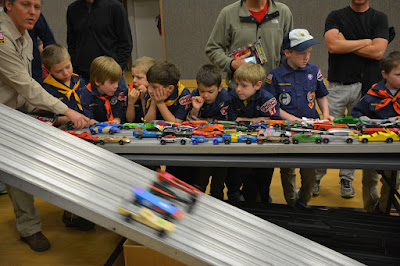I have learned the secret of being content in any and every situation, whether well fed or hungry, whether living in plenty or in want. Philippians 4:12 NIV
Only one time was he content.
As our second-oldest grandson finished
his first year of Cub Scouts, the time for the annual Pinewood Derby arrived. I
assumed I would help him build the car—many years before Dad and I had helped
my son build one. As I recall, it didn’t perform so well. I hoped for better
this time around. But I didn’t have to help my grandson after all.
Our daughter now had a fiancé who
spent a great deal of time with her two boys. He became the obvious choice for
the task. I didn’t mind so much. After all, he knew more than I did about constructing
the car, painting it, and aligning the proper weights. I let them enjoy the
experience together. When my daughter texted pictures of their work in
progress, I smiled. She had found someone to love her boys and our grandsons.
The big day finally arrived. My wife
and I made our way to the church hosting the event—9:30 on a Saturday morning.
I could have found other things to do, but our grandson needed our support. The
scouts, their parents, and the scout leaders had gathered the night before to
set up the aluminum track, weigh the cars, and test the cars. Everything was
ready.
As race time approached, we could
feel the anxiety in the room. We took our seats on the front row and waited nervously
for the beginning of the race. The scout leader explained the rules. Twelve
scouts had entered. Each car would race six times against different
competitors. Our grandson, who typically ran around, sat still and waited for
the leader to call number five—his number. He even watched closely as his
friends’ car raced, picking one of the two he wanted to win.
Each of the six times, the leader
called car number five, my grandson rose to his knees and looked intently as
his car pummeled down the track’s steep hill and launched toward the finish
line. He also gazed at the digital machine that told which car came in first
and which came in second. Like his mom, he’s competitive. If his car won—and it
did twice—he raised his arms in the air and whispered, “Yes.” When he lost, his
countenance fell, and a touch of anger raced across his face. He only
experienced satisfaction when his car won.
Paul had a rollercoaster life after
God called him to serve as a missionary to the world. More down than up.
Despite the challenges he faced—some life-threatening—he said he had learned to
be content. Doing so took him a lifetime, but he mastered the art of
satisfaction.
Almost everything in life teaches us
not to be satisfied until we meet certain conditions. I must have power,
possessions, pleasure, and relationships. And they must contain specific levels
or characteristics. If not, I must keep pursuing until they do.
One-time
presidential candidate Ross Perot said, “I’ll never be satisfied, that’s my
nature. If everybody pronounces it a Swiss watch that keeps time to a
thousandth of a second, I’ll be saying-well, how do we make it keep time to
another thousandth of a second? That’s just my nature.”
We learn satisfaction
by experience. As I get things, I eventually discover I crave more or different
things. They tear up, break down, get stolen or misplaced, or don’t bring the
joy they did when I first got them.
The pleasure
that came with power when I first received it dims over time. I remember how I
felt the first time I landed a supervisor position. My head swelled, my
shoulders arched, my back straightened, and my attitude changed. However, after a few months, I discovered that many headaches accompanied the power. What I thought would
satisfy didn’t.
And how much
have I spent on play toys? Not as much as some, but enough to take me into debt
more times than I care to remember. As when I was a child receiving new gifts,
the newness wore off after a while. I tossed them, sold them, gave them
away—and bought more.
Satisfaction
is a state of mind—a perspective we choose. Paul discovered satisfaction did
not depend on his circumstances or what he had or didn’t have. Satisfaction
depended on whom he knew. Before knowing Christ, he knew religion. He had been
trained in the most prestigious schools. But all that disappointed him. Only
knowing Christ and serving Him satisfied.
We can’t
attain this level of satisfaction on our own. Without God’s help, we’ll keep
running after the wrong things and throw our hands up in disgust every time our car doesn’t win the race or we see a car that looks better than ours.
With God’s
help, however, we can learn what Paul did: contentment comes with knowing
someone. When this is in place, we’ll enjoy all aspects of life. Whatever comes
our way, we’ll know it originated from God—and He loves us and gives us only
what is best.
Let God teach
you the art of satisfaction.
Father, I
look to You to find the true satisfaction I seek.
If you enjoyed this devotion, please share it with your friends.
Thanks to all our faithful followers who share our posts! We also invite you to follow and like us on Facebook, Pinterest, Twitter, and Instagram. Help us spread God's encouragement through His Love Lines.






No comments:
Post a Comment